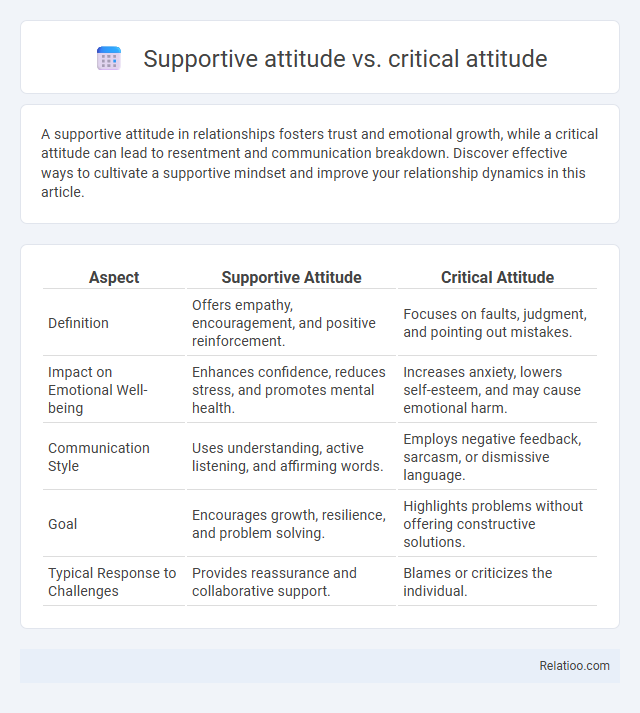A supportive attitude in relationships fosters trust and emotional growth, while a critical attitude can lead to resentment and communication breakdown. Discover effective ways to cultivate a supportive mindset and improve your relationship dynamics in this article.
Table of Comparison
| Aspect | Supportive Attitude | Critical Attitude |
|---|---|---|
| Definition | Offers empathy, encouragement, and positive reinforcement. | Focuses on faults, judgment, and pointing out mistakes. |
| Impact on Emotional Well-being | Enhances confidence, reduces stress, and promotes mental health. | Increases anxiety, lowers self-esteem, and may cause emotional harm. |
| Communication Style | Uses understanding, active listening, and affirming words. | Employs negative feedback, sarcasm, or dismissive language. |
| Goal | Encourages growth, resilience, and problem solving. | Highlights problems without offering constructive solutions. |
| Typical Response to Challenges | Provides reassurance and collaborative support. | Blames or criticizes the individual. |
Understanding Supportive and Critical Attitudes
Supportive attitude fosters collaboration and positive reinforcement, enhancing your relationships and overall communication effectiveness. Critical attitude emphasizes analysis and judgment, which can help identify problems but may create tension if overused. Understanding the balance between supportive and critical attitudes enables you to navigate social interactions more skillfully and promote constructive dialogue.
Defining Key Traits of a Supportive Attitude
A supportive attitude is characterized by empathy, active listening, and encouragement, fostering a positive environment that promotes growth and collaboration. In contrast, a critical attitude emphasizes evaluation, judgment, and pointing out flaws, which may hinder motivation and open communication. Attitude, in general, reflects a person's mindset and approach, influencing interpersonal dynamics and outcomes based on whether it leans towards support or criticism.
Characteristics of a Critical Attitude
A critical attitude is characterized by careful evaluation, analytical thinking, and a focus on identifying errors or inconsistencies. Unlike a supportive attitude that emphasizes encouragement, a critical attitude aims to improve situations through constructive feedback and objective judgment. Your ability to maintain a critical attitude ensures thorough assessment and informed decision-making.
Psychological Impact of Supportive Behavior
Supportive attitude in psychological contexts fosters resilience, reduces stress, and enhances emotional well-being by promoting a sense of acceptance and validation. In contrast, a critical attitude often increases anxiety and decreases motivation due to negative judgment and perceived rejection. The overall attitude significantly influences mental health outcomes, with supportive behavior playing a crucial role in improving interpersonal relationships and psychological growth.
Effects of Criticism on Personal Relationships
A critical attitude often damages personal relationships by fostering resentment, lowering self-esteem, and creating communication barriers, whereas a supportive attitude encourages trust, empathy, and open dialogue. Attitude shapes emotional resilience and relational dynamics, influencing conflict resolution and mutual understanding. Constructive feedback balances criticism with encouragement, promoting growth without harming connection.
Supportive Attitude in Professional Environments
Supportive attitude in professional environments fosters collaboration, enhances team morale, and promotes problem-solving by encouraging positive feedback and constructive assistance. This approach significantly improves workplace dynamics compared to a critical attitude, which often focuses on fault-finding and can lead to decreased motivation and increased conflict. Emphasizing supportive attitudes leads to higher employee engagement and productivity by creating a culture of trust and mutual respect.
Critical Attitude and Workplace Dynamics
Critical attitude in workplace dynamics fosters analytical thinking, encouraging constructive feedback and problem-solving, which enhances team performance and innovation. Unlike a supportive attitude that emphasizes encouragement and collaboration, a critical attitude challenges assumptions and identifies weaknesses to improve processes. Balancing critical attitude with empathy prevents negativity, promoting a healthy work environment where ideas are rigorously evaluated without diminishing morale.
When to Be Supportive vs. Critical
A supportive attitude fosters trust and growth by encouraging positive reinforcement and understanding during collaborative efforts, while a critical attitude emphasizes evaluation and improvement by identifying mistakes and areas for development. When to be supportive versus critical depends on context: offer support during initial learning phases or emotional challenges to build confidence, and apply critical feedback during performance reviews or problem-solving sessions to enhance skills and outcomes. Balancing these attitudes effectively requires emotional intelligence and situational awareness to promote both motivation and accountability.
Balancing Constructive Criticism and Support
Balancing constructive criticism and support requires distinguishing between a supportive attitude, which fosters encouragement and positive reinforcement, and a critical attitude, which highlights areas for improvement with clear, actionable feedback. Emphasizing a balanced approach helps maintain motivation while promoting personal and professional growth through targeted, respectful critique. Effective communication strategies integrate empathy and clarity, ensuring that feedback is both supportive and sufficiently critical to drive meaningful change.
Cultivating a Healthy Attitude for Growth
Cultivating a healthy attitude for growth involves balancing a supportive attitude, which fosters encouragement and positive reinforcement, with a critical attitude that promotes constructive feedback and self-improvement. Your mindset thrives when you embrace challenges as opportunities while maintaining openness to learning and adaptability. Prioritizing such a dynamic attitude enhances personal development and resilience in the face of obstacles.

Infographic: Supportive attitude vs Critical attitude
 relatioo.com
relatioo.com